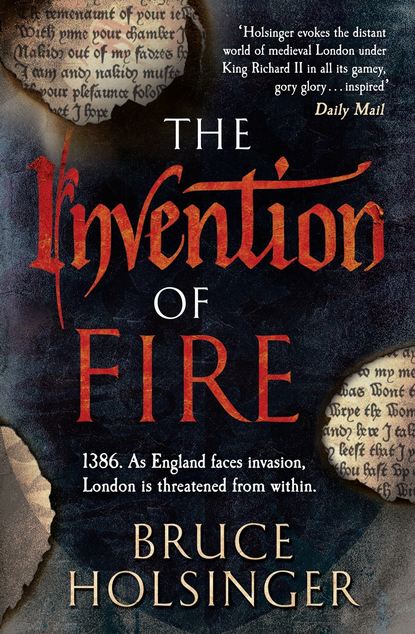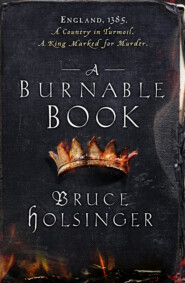По всем вопросам обращайтесь на: info@litportal.ru
(©) 2003-2024.
✖
The Invention of Fire
Автор
Год написания книги
2018
Настройки чтения
Размер шрифта
Высота строк
Поля
Yet Stephen could already imagine ways that might be discovered to render such devices more efficient, to constrict their girths, lessen their lengths, improve their firing, and now that the notion had entered his mind he yearned to get his hands on one of them and apply his own skills to the problem, to gauge for himself the intricate balances of weight and mass, force and propulsion guiding these wondrous instruments slowly multiplying across the battlefields of the world.
Stephen sat up straighter, feeling a need to impress the armourer. ‘Efficiency and beauty are hardly natural enemies,’ he said, ‘and weight can be compensated for by other means.’
Snell raised his heavy brow. ‘Go on.’
‘A simple solution to an unknown problem. A gun is no different from a hinge. The sorts of things I found and smith and repair at Stone’s – hinges, buckles, coffers, gates, bells, to say nothing of clocks and the like – they are the fittingest prologue one could imagine to the new guns your men are smelting and forging behind those walls. And no one in London melts and bends and tinkers as I do, or the devil take my—’
‘Body and bread,’ Snell completed the thought. ‘You make quite free with such oaths, Marsh. Are they sincere? Is this your earnest will, to know the privity of the armoury?’
Stephen took a large mouthful of ale and drew a sleeve across his lips. ‘Let me at your guns, Master Snell. Let me understand the tooling and mechanics of it all. By God’s bones you won’t be sorry.’
Snell studied him, fingers playing at his beard. ‘I hope not, Marsh. For your sake, and the sake of your craftsman’s soul.’
‘Aye,’ said Stephen confidently, and Snell seemed to coil up on himself as he reached for his jar. Stephen shivered, despite the tavern’s warmth.
‘You will come to the Tower in the coming days, then,’ said the armourer. ‘Give your name at the east barbican. One of my men will fetch you down to the yard.’
‘Very well, Master Snell,’ said Stephen, working to hide his pleasure, an anticipation something like lust. It was a too easy thing, in that flush of ale and ambition, to excuse the minor swell of vanity that had held him there talking to the king’s armourer, despite the sentence that kept him so tightly bound to Stone’s. For if Stephen’s heart lingered always at the foundry and forge, his pride looked now to the Tower, and the machines of a coming war.
Snell slipped out the cellar door as the taverner rang the closing bell. Stephen stood and mingled with the crowd of men staggering out to the lane. He crossed back over Aldgate Street as the first stroke of curfew rang from St Martin-le-Grand, and as he entered his own parish along Bellyeter Lane his pace quickened with his craftsman’s pulse, all his mind on the making of guns.
FOUR (#ulink_198f951f-53c4-599c-89f0-884ee833a23c)
‘I should feel worse,’ Hawisia Stone said.
‘And you don’t?’ Rose Lipton, midwife of Fenchurch Street, tapped at the sides of Hawisia’s belly, then bent to put an ear to her tightened skin.
‘The babe is less after prodding my bile this time. Haven’t coughed up a caudle in weeks.’
‘Nor would you, not at this stage,’ said Rose with a sniff. ‘You’re not longer than six weeks from birth, mistress. Now it’s all sore muscles and devil’s air, isn’t it?’
‘Aye, it is,’ said Hawisia ruefully.
‘And will only worsen these last weeks.’
Rose adjusted the poultice, an evil-smelling mixture of jasmine, roots, dung and St Loy knew what else, all gathered in a sack at the top of Hawisia’s bare belly, right below her breasts. Hawisia suspected the midwife reused her herbs and roots for her concoctions though didn’t want to say anything for fear of putting the woman off. It was hard enough keeping Rose Lipton happy and working as she should be. Often as not it felt as if Hawisia were the one hired to serve Rose rather than the reverse, despite the good coin the midwife took away after each visit.
Rose prodded some more, pressed her palms and fingers deeper into Hawisia’s heavy mound. At one point the midwife’s hands froze. She frowned.
‘What is it?’ said Hawisia.
‘Thing’s not turned round as it should be,’ said Rose as her hands resumed their wanderings. She clucked twice. ‘Don’t like it when they get footstrong.’
‘What does it mean?’
‘Nothing good, my dear,’ said the midwife, with one of her dark looks. It changed to a smile and she patted Hawisia’s wrist. ‘Should straighten itself out in time, though, with the right charms. Let me see what we have here.’
She dug through her bag and came up with a much-thumbed little book. Hawisia had seen it before, heard its bootless charms wheeze out through Rose Lipton’s wide lips. ‘Have you straightened your husband’s girdle, as I asked?’
‘Just there,’ said Hawisia, pointing to the delicate metal chain dangling from a bedpost. Wrought pewter, a gift from Robert on their wedding day, though crafted by Stephen Marsh, his chief apprentice then. Rose lifted it from the post and draped it across Hawisia’s waist.
‘It is a husband’s charm, you know. Shame Robert’s not here to sing it himself. I’ll lip it out for you though,’ she said helpfully.
‘I thank you for it,’ said Hawisia, tightening her jaw.
Rose fixed the clasp before Hawisia’s nether way. Hawisia could do nothing but lie there, propped up on her bed, as Rose recited the familiar words by rote. ‘I bound, as so shall I also unloose. I bound, as so shall I also unloose. I bound …’ The midwife murmured the girdle charm ten times, not reading from the book, simply thumbing the page containing the words and the rubrics for their use.
When Rose had finished she tucked the book away, followed it with the poultice, and helped Hawisia dress and sit up on the edge of her bed.
Hawisia, unable to stop herself, asked, ‘All seems well, then, aside from the babe’s position?’
Rose waggled a hand, shot out her lower lip. ‘You are well past where you’ve got to before, Hawisia, I’ll give you that,’ she said, but then shook her head. ‘Yet that means little when it comes to the birthing. How many is it you’ve lost to the flux since Robert Stone took you to wife? Two is it, or three?’
‘Four,’ said Hawisia, remembering them all. The first three gone in rushes of blood that could have been her menses if she hadn’t known better and cramped so badly. The last one was stillborn early, an unchristened lump pushed out into a world it would never see or know.
‘And Eleanor, she gave him two, aye? Sweet one, that Eleanor.’
‘Two. Yes,’ said Hawisia flatly. ‘Both girls.’ Eleanor Stone, Robert’s first wife, had been dead these eight years. The daughters were departed from the foundry as well, one recently married off to a wine merchant of Cripplegate Ward, the other gone to fever in her childhood. Robert would often speak of his late wife with a certain longing skidding through his voice, and though he never said so she could feel the contrast between his wives working on his desires.
Eleanor, fertile and fecund. Hawisia, barren and fruitless. Robert, wanting a son.
‘So your evil fortune weren’t from his seed, then, was it?’ said Rose with her brow raised, an inquisitive tilt to her head.
‘I suppose not,’ Hawisia said.
‘Good then.’ She nodded. ‘But don’t give in to despair, Mistress Stone. For the babe’s quick in there now, I can feel him shifting about, and who can say? Could be that Lady Fortune will turn the thing out alive.’ She wagged a finger. ‘Though don’t let your hope spring too fresh, Hawisia. Not with your luck.’
No fear of that, Hawisia thought, feeling her hopes pushed and pulled by the midwife’s shifting wisdom.
‘Dead birth can be a fearful thing though, can’t it?’ said Rose. ‘I well recall it with my third. John, it was.’ She sat back plumply on her stool and folded her arms. ‘We thought he was a choked one too, all grey in the skin, not a twitch from his toes to his nose. But my old gossip Grace, she thwacked the little thing on the arse she did, and out comes his screamin’ breath, loud and full as you’d like!’ She laughed merrily at the memory, which Hawisia had now heard at least ten times.
Rose packed her remaining things, then pushed the stool back beneath the bed and smoothed her dress as Hawisia shoved herself to standing. ‘So you see, Hawisia, y’must trust in the grace of God to sort wheat from chaff. Some of us be fecund, bursting with bairns, like my eight. Others are chosen to be virgins in a house a nuns. Others to be barren, such as yourself. But better to be barren than rotting off in a grave, aye?’
Hawisia walked the midwife down the outer stairs and through the house door to the showroom. Stephen Marsh was there, watching the shop in Hawisia’s absence.
‘Why good morn to you, Stephen Marsh,’ said Rose, beaming widely at him.
Stephen gave the midwife a nod. ‘Mistress Lipton. And Mistress Stone.’ He showed one of his too easy smiles, brushed away a dangling lock from his brow, and pondered them with those wide-spaced eyes, a soft doey brown. In the parish there were wives and widows alike who giggled and gossiped on those eyes. Not Hawisia. She sniffed and turned away.
Rose, though, paused in the doorway like a mud-stuck log. ‘How is the work, Stephen? Bells shining bright this autumn?’
‘As bright as ever, Mistress Lipton,’ he said. They spoke for a few minutes of newborn infants in the ward, and of Rose’s two unbetrothed daughters, fresh as new buds on an elm, each as lovely as a daisy, the midwife claimed.
Hawisia could sense Stephen’s awkwardness. She watched his eye shift toward the rear of the shop and the foundry yard. Stephen hated being trapped up front, she knew, just a hundred feet from his natural home amid the forge and metals yet in his mind a sea’s width away. He was like a penned bear up here, never truly content unless he was at his work – and Hawisia wanted him at his work. For with Robert’s sudden passing Stephen Marsh’s needful craft was all that stood between pounds and penury for the foundry.
How different it had been while her husband lived, when what she desired most keenly was prestige and the awed respect of the guild wives. If she could not have children of her own she would have the richest, finest foundry and smithy in the city of London, and it was up to Robert and his workers to make it so. More commissions, more customers, an ever-growing share of the city’s metalling trades.
And it was this nagging want, this thoughtless avarice that killed Robert Stone, despite Stephen Marsh’s hand in the accident. This she knew, and felt the weight of it every day, though it was easier in her mind to blame Stephen – and have him blame himself. Now all she wanted was to survive the birth of this only child, with enough coin for their bread and this roof. Her ambition had diminished with her future.






